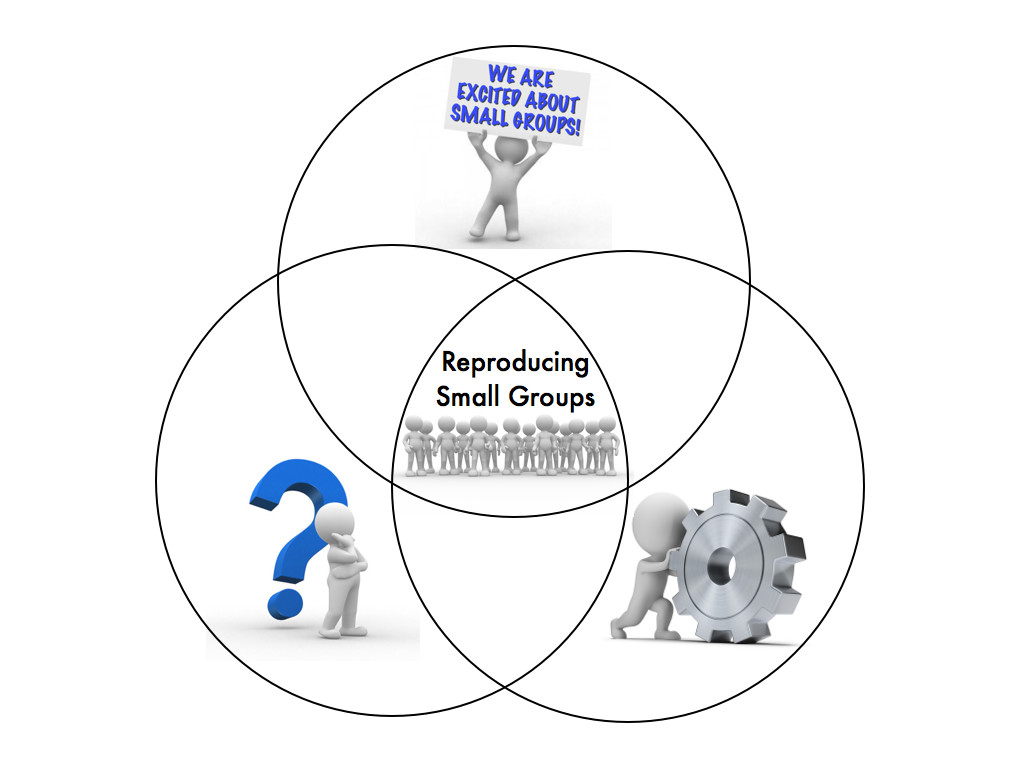How important is it to see growing small groups in our churches?
Christian Schwarz spearheaded a research project called Natural Church Development. The research center in Germany now has more than 20 million pieces of data about why churches grow and don’t grow. Schwarz says, “If we were to identify any one principle as the most important, then without a doubt it would be the multiplication of small groups.”
Unfortunately, when I talk to pastors and leaders about their small groups ministry I often hear a sense of hopelessness when it comes to growth and progress. These are a few of the common issues:
- It’s not doing what I want it to do.
- I don’t have enough leaders.
- The leaders I do have are flaky.
- Our small groups stir up a bunch of drama.
- Nobody in the church attends the groups we have.
Sound familiar?
In order not to get too discouraged or cynical we need to take a step back and remind ourselves of God’s pattern in Genesis chapters 1 and 2:
“Healthy things grow and multiply.”
Think about it… A newlywed couple actually has to take precautions NOT to reproduce, right? If they don’t come up with an intentional strategy and implement it right away they will be reproducing whether they wanted to or not and whether they prayed for it or not.
The same principle is true for churches and small groups (yes, I’m still talking about small groups). It’s all you read about in the Book of Acts. Based on history, especially in a densely populated Roman city, it’s believed that many of the house churches couldn’t seat more than 15-20 people. These small house churches, with no printed Bibles, rapidly grew and multiplied into a network of small house churches that spread across the entire world. Why? Because healthy things grow and multiply.
Using Genesis 1 and 2 as a backdrop, I want to share with you 3 Conditions for Growing Groups…
- Groups Feed on Weekend Seed (Gen 1:11-12, 1:29-30)
God placed Adam in an environment where seeds were perpetually being sown for him to be fed. Without the enriched environment, Adam would’ve died before he could reproduce. God created an environment that would feed him.
Our church culture and weekend services must feed the small group ministry. If small groups are just one of the many programs your church offers, it will never grow and hit critical mass. If we want to get people from the sanctuary to our sofa, we have to strategically marry the two settings to each other.
Here is some weekend small group seed…
- Preach on God’s relational kingdom that stands in contrast to worldly individualism
- Don’t make your weekend services an end unto themselves. Instead of saying, “We’ll see you next week,” say, “We’ll see you in small group this week!”
- Highlight small group wins in your weekend service.
- Sow the seed of the leader’s lifestyle. Have the lead pastor visit a group and talk about their experience in their message.
- Make sure the small group ministry has a solid, visible presence in the church lobby.
Is your church culture an environment that feeds your small group ministry?
- Begin with the “Kind” in Mind (Gen 1:12, 1:21, 1:25)
Steven Covey said, “Begin with the end in mind,” but in Genesis, it says they reproduced according to its kind.
We must ask the following questions:
- “What kind of results do we want our small groups to reproduce?”
- “Is our emphasis to have our small group close the backdoor?”
- “Is our focus to have our small groups represent a culture of investing in people and leaders?”
One church I worked at had a small group that wanted to put on a full retreat with a guest speaker for their small group. I had to spend some time re-directing them to the “kind” of results we were believing for in our small groups ministry.
A practical action step is to define your vision for your small groups ministry. For example, the stated vision for our groups ministry is “to see Real Life Groups become the most fruitful path of cultivating influencers at Real Life Church.”
That’s the “kind” of growth we want to see from our groups. Defining the right “kind” of fruit helps us to prioritize what we need to do and what we need to ignore.
- A Small Groups Approach that is Suitable will be Reproducible (Gen. 2:18)
The right small group system will be a “suitable” helpmate to your church and produce growth and multiplication. Be careful not to hastily adopt the latest groups model you heard about at a conference, seminar or workshop.
You do need to land on a specific strategy that will fulfill your vision, but it should be catered to your local context. Running groups without a detailed design is like God leaving Adam by himself and saying, “Ok Adam, now I want you to reproduce.”
There are ten or so different, proven groups models out there. Some lean towards short-term groups, others lean towards long-term groups. I’ve used several different paradigms over the years, but they’ve always been a modified hybrid of a template.
Here a just a few questions you need to be able to answer when moving forward with your plan:
- How does our strategy show that we’re trying to connect every single person in the church into a group?
- How do we identify new, potential leaders in our system?
- How do we care for and develop our current leaders in our system?
- How are new groups formed and filled in our system?
Once you have this in place, you can begin to align your resources to implement the vision (staff, training, coaching, assessments, etc).
I have personally experienced the dynamic of working towards these three conditions and seeing a convergence of unity, excitement and lives changed. There’s obviously a lot more that could be unpacked here, but we’ll save that for a future article. Remember, healthy things grow and multiply.
BIO
Andrew Mason is the Small Groups Pastor of Real Life Church, a family of churches across the Northern CA region. He is also the Founder of SmallGroupChurches.com, and the Northern CA Regional Leader for the Small Group Network. Andrew resides in Sacramento, CA with his wife Camille and their two sons.






